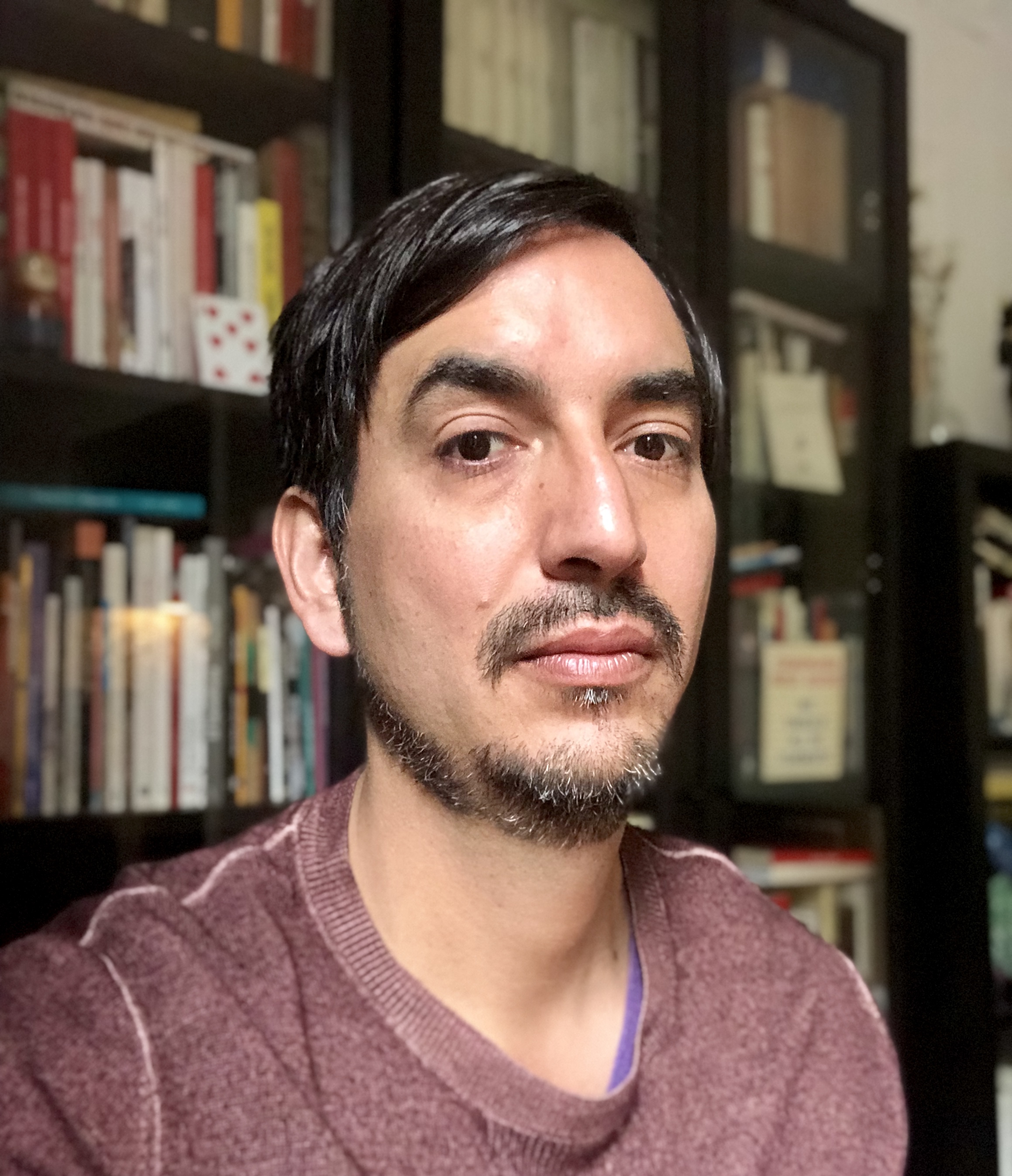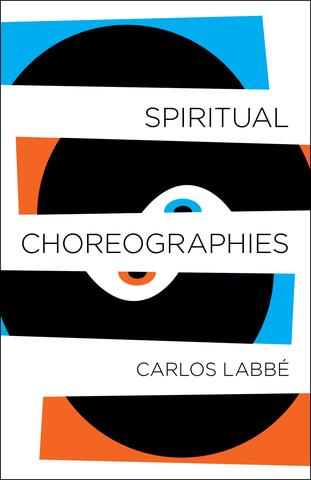Music Is the Best Propaganda: An Interview with Carlos Labbé
Interviews
By Wilson McBee
The Chilean writer Carlos Labbé approaches his novels as sites for narrative play rather than vehicles for straightforward storytelling. Reading his books can be challenging, but also rewarding, almost as if you’re working in collaboration with the author to construct meaning from the various threads he weaves together. Spiritual Choreographies is Labbé’s third novel to be translated into English—like the first two, by Will Vanderhyden—and is ostensibly the biography of a fictional rock group, known simply as The Band. But as becomes apparent from the book’s very first page, Labbé has no interest in hitting the conventional Behind the Music plot points. Or, rather, he has no interest in delivering those moments in a conventional way. The book is formulated in a back-and-forth style in which an elderly paraplegic, formerly the band’s lead singer, attempts to tell his story and that of The Band in brief, poetically sputtering passages:
He, the boy, wanted to play the part of the young macho warrior and not humanity’s savior.
He wanted to be the liberator and not the vocalist in a band.
I am he, and yet. No more. This useless body that once leapt across stages.
These are followed by lengthier sections, titled “Corrections,” in which a seemingly more authoritative third-person voice provides fuller descriptions of the moments alluded to earlier by the narrator. Yet these corrections are often as contradictory and digressive as they are explanatory. As more voices intrude on the narrative, basic facts about the characters and the band are revealed, and Labbé uses the twisting storylines to comment on colonialism, pop culture, and feminism, among other subjects. In the following interview, Labbé answers questions about the book’s origins, structure, and themes. He also created a playlist for readers interested in the connections between twentieth-century Chilean pop music and American rock and roll, which you can listen to here. Many thanks to translator Will Vanderhyden for his collaboration on this interiew.

Wilson McBee: Spiritual Choreographies weaves together a number of different threads—a paraplegic dictating his autobiography, a mother and her son walking through a forest, the history of a fictional band, among others—sometimes within the same section, even within the same paragraph. As you conceived the book, did one of these threads emerge first? As you wrote the novel, did you prioritize one above the others?
Carlos Labbé: The first narrative was the history of a fictional band. I wrote three or four of the chapters about The Band for a Costa Rican countercultural magazine (The Costa Rica Space Program) back in 2005; then I penned the full story in a personal blog (also called Coreografías espirituales) in 2005–2007. When I realized I had the complete memoir of a fictional Chilean band that nobody knew and nobody cared about—what would the biography of those who never existed be?—I started making corrections to turn it into a novel instead. I cut a lot of that full story. During the process of correcting, I suddenly felt that I was the Other, the one who should introduce revisions and changes even though it’s not his story. The book became full-fledged when the voices of the rest of the band protested that it was the Other who was in charge—who is usually in charge—and convinced me that their stories needed to be included to guide the book toward its ending, that not every member of a collective needs her path to be told in a realistic way or in a first-person narrative voice.
WM: The book is written in at least two “voices,” as I see it, the untitled first-person dictations from the paraplegic twin brother and the third-person “corrections” that flesh out the narrative. As you wrote the novel, how did you alternate between these voices? Did you always write the “corrections” after the first-person sections, or was the process more fluid?
CL: First I wrote the corrections and then the first-person voice. I tried to find spiritual choreographies in the alternation of these two voices. The back-and-forth of the turning page, from a fluid first-person memory-trip to an objective, fact-based narrative: that’s the movement I sought while imagining I was composing a dance for the beloved-yet-unknown reader of Spiritual Choreographies. A literary harmonization of two melodies that would shape the novel’s rhythm, trying to apply Bach’s principle of counterpoint to contemporary fiction.
WM: You deploy a fluid concept of character in Spiritual Choreographies. While the general outlines of the main characters remain relatively stable, details and backstories change constantly. How did you develop this strategy of character, and were you intentional in keeping certain details the same throughout the book?
CL: At the beginning, I had a sort of conventional, hundred-page story of The Band. All facts, and the characters were consistent and stable. But it read as a treatise on fame, glorification of celebrity, and pop-stardom nonsense, when what I wanted was to reflect on how a collective of artists can remain a collective even in success, and at the same time how that collective could be an economic entity, a politically transformative force, a non-conservative model of family, and above all, a creative society built around the woman (the percussionist), instead of around the Lennon-McCartney alpha males (the vocalist-the other/the guitarist). So, I broke up the hundred-page memoir, I heavily edited it, and started adding nonconventional voices. Each of those voices introduced their own backstory, sometimes even offering facts that contradicted previous ones. So, to be fair to the collective and to allow everybody in The Band to be heard in the novel, I embraced contradiction, strangeness, and fluidity—just like the political madness and the never-ending news cycle we currently experience in our everyday lives.
WM: The musical references in the book come from Latin America and the US. How important was it for you that the book have an international soundtrack?
CL: It was necessary to make the story of The Band—a collective of musicians with humble roots in the deeply rural parts of the Protectorate, in the city of the Central Empire, and in an Old Empire town, who later blow up and become pop stars on a global scale, and finally retire as a radical community in the Anti-Empire—plausible. It’s a reflection on immigration, and on the effects that successful immigration has when it comes to restructuring narratives of identity—something typically not openly addressed in Latinx contexts. What would an unbiased account of the music, the books, the works of art of a bilingual, trilingual, pansexual, anti-border, inclusive collective be?
WM: But music provides more than just background fodder in Spiritual Choreographies. It is also connected to the book’s politics. One example is when the vocalist says, albeit ironically, to an audience, “We musicians envy the class struggle, for none of you will ever listen to us the way you listen to your political leaders.” How do you see politics and music working in the book? Further, do you see a connection in the book between American rock and roll and colonialism?
CL: I believe that music is an extremely efficient political weapon, and so it is one of the last resources for the self-care and survival of we the people. You can now see how teenagers are protecting and exploring their subjectivities through ASMR and other sounds. Thank all the gods that the Trumps of the world are too dense or too insensitive to understand this on the level of personal experience. It’s the best kind of propaganda, because it doesn’t operate on a discursive level, but on a sensual and emotional level. You could also say that Spiritual Choreographies seeks to make sense on that level.
About American rock and roll and colonialism, I think blues/urban/black music and country/rock/folk are anti-imperialism from below. They are popular expressions that can easily conquer capitalism by subverting it, and most of the time they are a source of inspiration for the struggling musicians from the Southern part of the world. Latin-American and Latinx music—just like Latin-American literature—is a synthesis of indigenous, African, European, and blues/country traditions, and because of that synthesis, music is a protest against all governments that maintain our countries are pure and belong to white oligarchs.
WM: Somewhere around the middle of the novel, it becomes clear that we are reading an alternative history of twentieth-century Latin America, with references to the Empire, the Anti-Empire, and the Protectorate. At what point in the process did you decide to take liberties with history, and what led you to that decision?
CL: That’s part of the project encompassed by all ten of my books: we need to use fiction and active reading to explore in detail, and thereby experience, a better society, a more exciting, equitable, and fair collective, as if it already existed—because it does exist in the best literary works I read. That project includes retelling history from different points of view and using different modes of storytelling, not just realism and fact-based third person, but being expansive and incorporating all of them. It also includes abandoning the obsession with location, because the Protectorate of Capitalism is Chile, Puerto Rico, Panamá, or South Korea, but also South Africa and old empires like the UK, Spain, Russia, or Iraq.
WM: How does the “Pastortale” section, which comes in the later third of the book and deviates from its standard first-person/correction rhythm, serve to comment on the rest of the book’s fictionalized historicizing?
CL: The “Pastortale” is an autonomous section framed in the novel as a children’s book that the former members of The Band read to their son as a bedtime story. So, it’s presented as a fantastical epic. I wanted the three tricksters/animals who serve as main characters to mutate and to be interchangeable as if they were everyday people trying to survive the crisis (always) yet to come. They are hungry and thirsty while the people who rule are plotting corrupt business enterprises in order to acquire even more, so they spend most of the tale in jail. At the end, they get out and realize they have become heroes of the masses, who surround the government palace and plan to eat the president and his secretaries. I would say it’s about everyday people who suddenly become a guide for the masses, about the responsibility of anonymous artists to oppose our most powerful political leaders.
More Interviews



